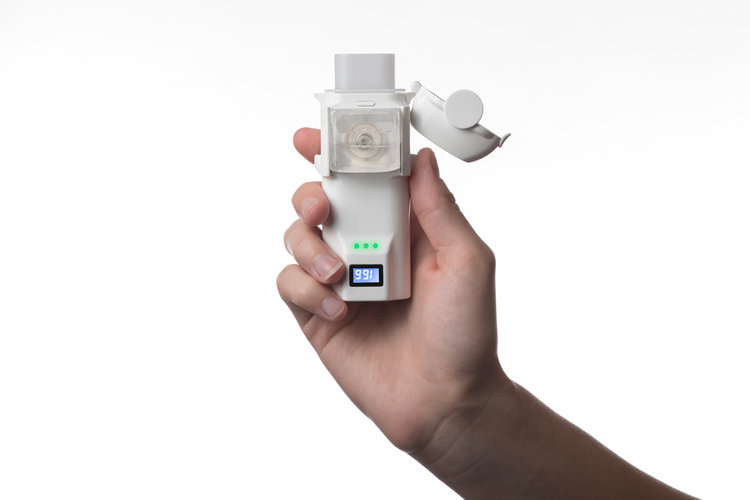
North Carolina-based Pneuma Respiratory has announced a fully digital soft mist inhaler device. The inhaler can deliver several different types of medicines directly to the lungs, and by syncing with a mobile app can be used to verify dose delivery in real-time.
“What we’ve done is created the first electronically breath-actuated inhaler,” James Bauler, VP of business development at Pneuma Respiratory, told MobiHealthNews. “There’s a lot of user error involved in the current inhaler technologies, it’s really well documented. One of the primary things is coordinating, activating the device, and inhaling the drug that’s being dosed. We were able to eliminate that problem by using digital technology to electronically deliver the drug as the person breathes.”
The two-year-old startup’s device detects users’ inhalations, and automatically ejects droplets containing the medication. As such, the device requires no propellants to deliver medications to the user’s lungs. It also features tamper-proof disposable ampoules, and can be used for single or multi-dose applications.
However, it’s the corresponding smartphone app is the key to ensuring that users receive their medication as intended, Bauler explained. Not only is the system able to track usage over time and display these multi-day data in charts for easy reference by patients and providers, it actively instructs users on how best to take their medicine.
“The whole platform is digital, so all the data can be captured. You may have seen other platforms capture dose timing, when you did the dose, what some things were happening in the environment around you, but there are some other things that are pretty neat built into [our device] that help coach the patient to use the device better,” Bauler said. “A common user error is not holding your breath … at the end of dosing or of delivering the medicine. So, really simple prompts to encourage people to hold their breath are one of the things that we’re looking at integrating into the app, ultimately to improve the user experience and the efficacy.”
The device is still some ways away from FDA clearance. According to Pneuma, the device has been validated in two proof-of-concept clinical studies of chronic obstructive pulmonary disease (COPD) patients. In these, small-molecule asthma and COPD medications were delivered via the company’s platform, with patients’ bronchodilaton serving as the primary outcome. Pre-clinical binding and denaturation studies also suggest that the device is capable of delivering larger and more complex biologics without jeopardizing their function, findings which Bauler said could open the door beyond asthma, COPD, or other conditions traditionally treated with inhaler devices.
“From a lab perspective, very positive signs from the pre-clinical work and we are planning to conduct a small clinical study here before the end of this quarter,” he said. “We set out to improve inhalers, and what we believe we’ve created here is a platform for drug delivery. In one conversation with one of the pharmas we have been talking with, their response to us was ‘Guys, this isn’t just an inhaler. You’ve created a drug delivery platform.’ I think that’s what we’re really bringing to market.”

 device
device